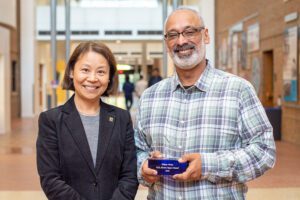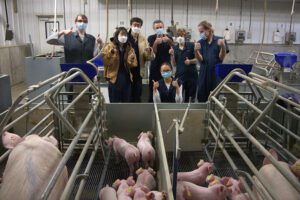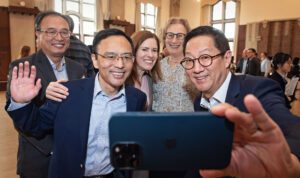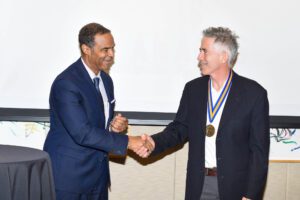The Institute for Energy Solutions will continue U-M’s 75-year legacy of leadership in energy research.
The post Equity in the energy technology transition is new Institute’s goal appeared first on Michigan Engineering News.
The Institute for Energy Solutions will continue U-M’s 75-year legacy of leadership in energy research.
The post Equity in the energy technology transition is new Institute’s goal appeared first on Michigan Engineering News.
Euisik Yoon’s team, led by Sungjin Oh, developed a low-power neural recording front-end circuit to interface with state-of-the-art neural probes.
The post Best paper for a low-power ADC circuit for brain-machine interface applications appeared first on Michigan Engineering News.
A team led by P.C. Ku and Qing Qu has developed a miniature, paper-thin spectrometer measuring 0.16mm2 that can also withstand harsh environments.
The post Miniature and durable spectrometer for wearable applications appeared first on Michigan Engineering News.

Verma credits his distinguished 30-year executive career with leading technology companies, including Savi Technology, Lockheed Martin and 8×8 Inc., to a combination of education, leadership, and luck.

Known affectionately as “The Sh*tty Project,” Codling, an ECE PhD student, monitors the vibrations in pig pens to track the health of the piglets and predict when they’re in danger.

Wei Lu talked about his innovations as the 2022 Distinguished University Innovator, followed by a panel discussion about the University’s role in fueling new high tech companies in the area.

Flynn is one of the world’s premier scholars of analog and mixed-signal integrated circuits and systems, analog-to-digital conversion (ADC), and other interface circuits.
Prof. Zetian Mi’s team are the first to achieve high-performance, highly stable green micro-LEDs with dimensions less than 1 micrometer on silicon, which can support ultrahigh-resolution full-color displays and other applications.
The post Breakthrough in green micro-LEDs for augmented/mixed reality devices appeared first on Michigan Engineering News.
New technique could enable processing speeds a million to a billion times faster than today’s computers and spur progress in many-body physics.
The post Seeing electron movement at fastest speed ever could help unlock next-level quantum computing appeared first on Michigan Engineering News.
The CHIPS and Science Act of 2022 promises to revitalize the U.S. semiconductor industry. Dennis Sylvester offers his perspective on what it means for ECE.
The post CHIPS and Science Act: Implications and opportunities appeared first on Michigan Engineering News.